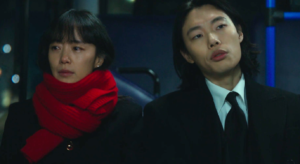
Like most K-dramas, Lost is about many things. It speaks to the tragedy of aging, the slipperiness of true love, the moral ambiguity of illicit affairs, and the sheer difficulty of “making it” in an increasingly competitive world. But more than anything, Lost is about depression. This is its driving force and the main reason why, despite its many flaws, it’s still worth watching.
The series, which stars Jeon Do-yeon as Lee Bu-jeong and Ryu Jun-yeol as Lee Gang-jae (no relation), is at its best when it is humanizing the mental illness via its leads. Everything else about the drama makes it quite difficult to watch. The pacing is sluggish, the storylines are disjointed, and some of the topics covered—important as they are—can be very triggering for certain viewers. With multiple references to suicide and depictions of domestic abuse, Lost is certainly not for everyone.
It can also ring hollow at times, because while it expertly relates the feeling of depression, it doesn’t do a lot to critique it or offer courses of action. Still, for those who are willing to see it, the drama has its rewarding moments. It brings to life a misunderstood condition and offers a lot of compassion and relatability in the process. Lost is sometimes illuminating, sometimes frustrating, but always sympathetic to the cause.
In the first episode of the series, we find Bu-jeong, a smart, eloquent, 40-something-year-old, in a peculiar state. She’s trolling a famous actress on Instagram, and even though she has received numerous legal warnings to stop, she is undeterred. “There’s no use suing me,” Bu-jeong tells her target through a comment. “If you keep doing that, I’ll write your name in my blood, send it to the TV station, and kill myself.”
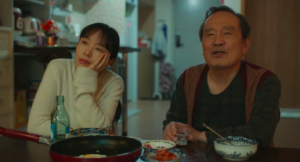
We learn pretty quickly that this is not hyperbole. Bu-jeong recently tried to take her life as part of a “group suicide,” and even though she eventually walked away from the attempt, her overall outlook is severely grim. But who can blame her? The celebrity she “attacks” is actually a former client who physically abused her, her marriage has been on the rocks for years, and her writing dreams seem to be going nowhere. Except for visits to her father (a ray of sunshine in her otherwise bleak life), Bu-jeong doesn’t have a lot to look forward to. In one such visit, she admits in between tears:
Dad, I think I failed… I didn’t become anything, and I think I won’t ever make something out of myself. I have you and my husband, but I’m just so lonely. My life is such an embarrassment.
Lost is full of plain but perceptive insights like this. A conversation about favorite ramen flavors turns into a poignant observation of how depression can rob you of preference. “I used to have likes and dislikes,” Bu-jeong shares, “but at some point, everything just became the same. Everything disappears altogether.” Likewise, a simple question like “Why are you sad?” results in a thoughtful rumination on the merits of being seen. “Thank you for saying I’m sad,” Bu-jeong replies earnestly. After being labeled mad, irritable, and even insane for so long, she’s just grateful that someone finally got it right.
The best moments of Lost are the ones that try to shed light on how most people with depression think, feel, and act. The empathy shown to Bu-jeong (and by extension to viewers who relate to her) is so present and comforting that it’s almost enough to make the show a great watch.
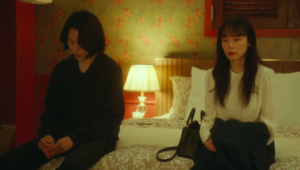
The thing is, because of its weighty premise, Lost is very difficult to sit through. Death, sickness, and grief permeate the drama through and through, resulting in countless crying spells and brooding silences. And even though Lost features love, it covers the “wrong” or untraditional kind (affairs and second marriages) so that the rare moments of sweetness we get are often undercut with guilt or tragedy.
All of these would have added greatly to the drama if they were handled with more care, but Lost fumbles its many storylines and characters. They make sense individually, occasionally feeling nice, but only a few of them tie neatly into the story.
A side plot about the suicide of Gang-jae’s friend, for example, is initially teased as having some ulterior motive behind it. But the mystery fizzles out and ends up being an annoying red herring that does nothing to forward or inform the show. Similarly, the character of Jeong A-ran (Park Ji-young) is played up as a villain, but since she ceases to hold any power over Bu-jeong very early in the series, the ongoing threats she makes and the stakes she presents fall flat and irrelevant. Again, these elements are intriguing on their own, but the loose tie-ups don’t do them justice.
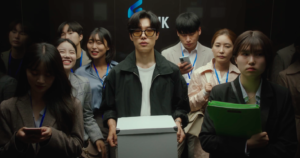
Perhaps the most frustrating victim of this disjointed effort is Gang-jae himself. As Bu-jeong’s love interest, Gang-jae is more fleshed-out than the other characters. He is emotionally complex and motivated, and he gets a lot of flashbacks and scenes with his friends and family. Ideally, he has a lot of room to change and even grow as a person, but by the end of the series, he remains to be nothing more than Bu-jeong’s object of desire.
This seems like a wasted opportunity, especially since the “stand-in” service that he runs (a business where he essentially sells himself to clients, becoming anyone they want him to be) is rich with potential commentary. On a personal level, it hints at his detachedness from his emotional self. On a societal level, it speaks to the dehumanization we’re willing to go through for money, and as well as to the unprecedented level of loneliness we’ve reached as a people. Gang-jae’s business is doing so well because someone is always in need of a friend, lover, or family member—roles he fakes so well.
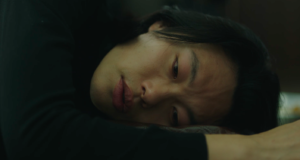
Sadly, this is never explored in-depth, and the exploitative system that keeps Gang-jae’s business in place is never really critiqued. Similarly, Bu-jeong’s triggers, such as the physical assault she had to endure by a person in power, and the expectations she has to uphold as a woman in her 40s, are never really questioned. The series doesn’t seem to be interested in the bigger picture, which is why issues like these (and there are many) aren’t so much explored as they are merely exposed.
The show lacks teeth in this regard, but ultimately, it’s a step in the right direction. At its core, minus all the filler and fluff, Lost is a poignant, empathetic look at depression and how we as humans struggle to find purpose in an increasingly nullifying world. It’s sadly weighed down by fragmented side plots, poor pacing, and a lack of analysis, but if you can sit through all that, then this show comes highly recommended. Like the best of us, it’s filled with worthwhile moments, even if it sometimes seems like it’s headed nowhere in particular.
(YouTube. The Korea Times. Images via JTBC.)


